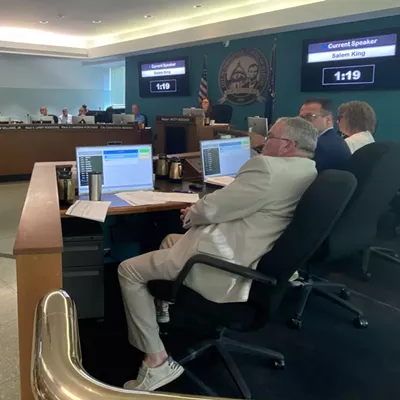A modern day wild, wild west
By Holly A. WhislerIn order to understand today’s markets, it is necessary to take a step back and look at the big picture, the trends and stages, explained Michael Lansden, first vice president of investments and branch manager for the Stifel office in Jacksonville. He said the stock market typically goes through long-term stages, sometimes referred to as bull and bear markets.
“This bull market began after the market recovered from the coronavirus-induced bear market – the shortest on record. Prior to that, we were in the longest-running bull market in history,” he said. Lansden believes we are in the latter stage of a bull market, which he described as the “euphoric” stage. This typically brings forth speculative trading, like that which we are seeing today. Cryptocurrency and meme stocks are speculative, high-risk investments that have become part of everyday conversation and social media sensations.
Joel Gustafson, an investment adviser with Momentum Independent Network Securities, 3040 Spring Mill Dr., Ste. A, said, “Any and all investments have a quotient of risk, but speculative investments can be an all-or-nothing type of investment where you could lose everything.” Gustafson explained that cryptocurrency is not being used for its intended purpose – as currency. Rather, he said, “Ninety percent of people are using it as a speculative investment. Most are hoping to invest in the next bitcoin – the most popular and well-known cryptocurrency. But when you consider a kiosk of any kind to be a proper way to invest, it shows you the absurdity of cryptocurrency,” he said, referring to the kiosks at gas stations and other retail locations that allow customers to purchase cryptocurrency.
Meme stocks, as the name implies, are highly speculative as their value is influenced by users of social media spreading hype, not a company’s actual valuation or performance. Lansden warned of the inherent danger when “investing in items because you don’t want to miss out, instead of investing in solid, long-term ideas that look attractive.” A meme stock that suddenly looked attractive at the beginning of the year was GameStop. Gustafson explained that GameStop was bleeding money, and a large number of Reddit users who belong to a subreddit known as WallStreetBets played a major role in driving up the price of GameStop stock, which then caused huge losses for many U.S. firms and short sellers. Gustafson explained, “When you short a stock, there’s no limit on how much you can lose.” This was the first of its kind – a social media-driven effort to disrupt the markets – but not necessarily the last. Gustafson said, “People who invest in meme stocks are investing in companies that are not financially healthy. We each have our own definition of risk and reward, but you have to ask yourself: What am I willing to accept?” He noted that to be speculative means you can make large gains very quickly, but you can also lose it all very quickly. While losses may still happen with other investments, the risks are much greater with these types of stocks.
Lansden said, “This leads to the question: What to do now? Do you chase these investments?” He said that even clients who have taken a conservative approach to investing are going to be curious and ask about cryptocurrency and meme stocks. Gustafson said it’s an adviser’s role to evaluate just how much risk a client can afford to take while protecting their overall portfolio.
Both advisers agree that the answer to these questions is: It all depends. Lansden said, “If you are younger and can afford the risk, keep the money invested and keep investing for the long term.” Gustafson agreed, “It’s one thing if you’re 30 years of age and can rebuild when you lose, versus if you are the client near retirement age.”
If you are in retirement or close to retirement, Lansden suggested, “Reevaluate and potentially take some profits and rebalance the portfolio into more conservative investments, but keep in mind that rebalancing may have tax consequences, which should be discussed with a tax adviser.”
Gustafson added, “Investment advisers still believe in determining a client’s risk-return profile, and while we do not have the ability to predict the markets, we know our clients and their investment profiles.” According to Lansden, a good suggestion is to keep the long term in focus and, as Warren Buffett said, “Be fearful when others are greedy, and greedy when others are fearful.”
Holly A. Whisler looks forward to her conservative investment approach paying off so that someday she can watch the sun set over a beautiful body of water.















